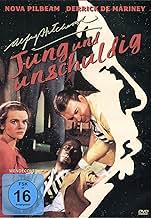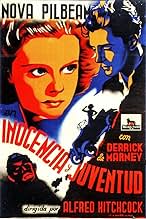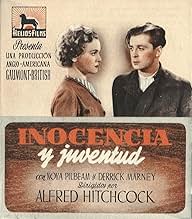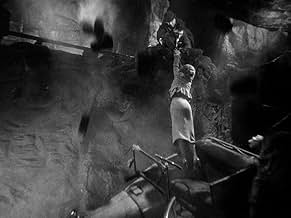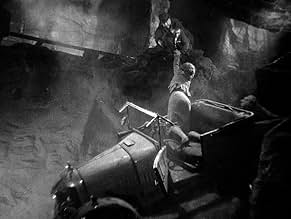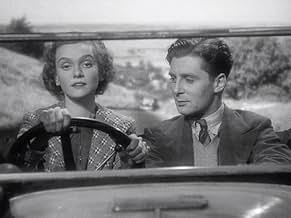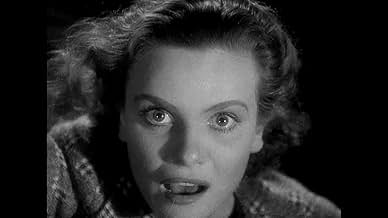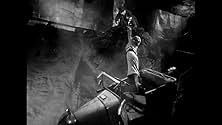IMDb RATING
6.8/10
12K
YOUR RATING
A man on the run from a murder charge enlists the help of a beautiful stranger who must put herself at risk for his cause.A man on the run from a murder charge enlists the help of a beautiful stranger who must put herself at risk for his cause.A man on the run from a murder charge enlists the help of a beautiful stranger who must put herself at risk for his cause.
- Awards
- 1 win total
Derrick De Marney
- Robert Tisdall
- (as Derrick de Marney)
Frank Atkinson
- Petrol Pump Attendant
- (uncredited)
Clive Baxter
- Burgoyne Boy
- (uncredited)
Pamela Bevan
- Little Girl at Party
- (uncredited)
Ernest Borrow
- Policeman Outside Courtroom
- (uncredited)
Featured reviews
Hitchcock is in a class by himself. I'll give any of his films multiple viewings. The story and structure of "Young and Innocent" resemble "The 39 Steps," with a young woman helping a young man on the run thwart the police and prove his innocence. This film is a standout, though, not because of the story or acting (both charming), but because of a virtuoso bit of directing by the Master, in which the location of the killer is revealed. As I watched the scene unfold for the first time, I remember thinking, "This is what makes Hitchcock Hitchcock." I wish I had never seen any Hitchcock films so I could watch them all again for the first time. His is a brilliant body of work, and this is an often overlooked example of his mastery of the film art.
This is a good Hitchcock film, but on the lighter side. The acting may be disputed (certainly many dispute about it!), but in my opinion it is a very solid, entertaining, and well-acted picture. It does have much of Hitchcock about it (not surprisingly) and is well worth watching. All of the classic Hitchcock elements are there, and they fit together wonderfully: the musical score, the camera work, the twists and turns in the plot, the thrilling scenes, the build-up, the director himself ... and not to forget the story! This is built up very carefully, and contains many, many interesting side-glances and elements. But one needs to watch the film very carefully, or more than once, in order to find these. It is indeed a sort of '39 Steps', and a precursor to several later Hitchcock films, but in its own way it occupies a place rather different than any other Hitchcock film. I am referring to a certain 'bucolic' atmosphere, which is perhaps only equalled by 'The Trouble With Harry'. The parallels to this film have perhaps not yet been adequately explored.
Another wrongfully-accused-man-on-the-run tale from Hitchcock, this time starring Derrick De Marney as a singer accused of murder. He escapes custody with hopes of clearing his name, and gets some unexpected help from Erica (Nova Pilbeam), the daughter of a police inspector. With Percy Marmont, John Longden, Edward Rigby, Mary Clare, Basil Radford, George Curzon, George Merritt, Bill Shine, and Torin Thatcher.
This was becoming well-trod territory for Hitchcock even back in '37, and De Marney & Pilbeam don't quite have the screen charisma of Donat & Carroll, but this is still enjoyable if one keeps their expectations in check. There's some miniature work featuring some trains and cars, and suspenseful mine collapse. The finale, with a band in blackface, may keep this one on the lesser-shown list. Pilbeam was 17 when this was filmed, while her romantic onscreen partner De Marney was 31.
This was becoming well-trod territory for Hitchcock even back in '37, and De Marney & Pilbeam don't quite have the screen charisma of Donat & Carroll, but this is still enjoyable if one keeps their expectations in check. There's some miniature work featuring some trains and cars, and suspenseful mine collapse. The finale, with a band in blackface, may keep this one on the lesser-shown list. Pilbeam was 17 when this was filmed, while her romantic onscreen partner De Marney was 31.
Young and Innocent (1937)
The title is appropriate to the point of being redundant, because in nearly every Alfred Hitchcock film the key theme is an innocent man accused. In this case, accused of murder, and the young man is a charming English actor, Derrick De Marney. As the police begin their hunt, he runs into the police chief's daughter, played by Nova Pilbeam, a tomboyish answer to Katherine Hepburn, and the real star of the movie.
This is a late British Hitchcock film, and it feels slightly raw around the edges, but it's so fast and likable and well constructed, you have to love it. In fact, the suspense of getting caught is balanced by some downright slapstick scenes that are brief and hilarious. And a reminder that this is a romp, the whole thing a beautiful, spritely entertainment. Never mind a killer is on the loose, because if one man is innocent of murder, another, out there somewhere, it not.
This is 1937, and by 1939 Hitchcock has moved to the U.S. to do Hollywood movies (including the amazing Rebecca in 1940), and so Young and Innocent and The Lady Vanishes (which has a similar quaint feel) wrap up his long British period. It says a lot for a movie to say I could watch it again, not because it's technically astonishing, but because it's just a joy, and very sweet. Never mind a little corniness or an inevitable ending, it's good!
The title is appropriate to the point of being redundant, because in nearly every Alfred Hitchcock film the key theme is an innocent man accused. In this case, accused of murder, and the young man is a charming English actor, Derrick De Marney. As the police begin their hunt, he runs into the police chief's daughter, played by Nova Pilbeam, a tomboyish answer to Katherine Hepburn, and the real star of the movie.
This is a late British Hitchcock film, and it feels slightly raw around the edges, but it's so fast and likable and well constructed, you have to love it. In fact, the suspense of getting caught is balanced by some downright slapstick scenes that are brief and hilarious. And a reminder that this is a romp, the whole thing a beautiful, spritely entertainment. Never mind a killer is on the loose, because if one man is innocent of murder, another, out there somewhere, it not.
This is 1937, and by 1939 Hitchcock has moved to the U.S. to do Hollywood movies (including the amazing Rebecca in 1940), and so Young and Innocent and The Lady Vanishes (which has a similar quaint feel) wrap up his long British period. It says a lot for a movie to say I could watch it again, not because it's technically astonishing, but because it's just a joy, and very sweet. Never mind a little corniness or an inevitable ending, it's good!
Sort of a blueprint for any number of later, more bloated Hitchcocks: The man falsely accused of murder; the sympathetic miss who helps him, the set pieces in creepy places. This one has a lighter, more picaresque feel than most of the Master's movies, with irrelevant but diverting supporting characters, Maguffins, an unstarry cast, and an unusual dollop of humor. It's also blessed by a screenplay that leaps nimbly from improbability to improbability, as much as its more famous contemporaries, like "The 39 Steps" or "The Lady Vanishes."
The light tone throughout tips us off that everything's going to turn out all right, so there's less suspense than we associate with Hitchcock. Still, it's beautifully photographed (with one really stunning crane shot), beautifully paced, and enjoyably acted. The unstoried Nova Pilbeam is a standout: She's the ideal Hitchcock heroine, blonde, slender, and spirited.
The light tone throughout tips us off that everything's going to turn out all right, so there's less suspense than we associate with Hitchcock. Still, it's beautifully photographed (with one really stunning crane shot), beautifully paced, and enjoyably acted. The unstoried Nova Pilbeam is a standout: She's the ideal Hitchcock heroine, blonde, slender, and spirited.
Did you know
- TriviaAlfred Hitchcock: Outside the courthouse holding a camera as Robert Tisdall (Derrick De Marney) escapes (at about 0:16:10).
- Goofs(at around 50 mins) When Erica Burgoyne and Robert Tisdall have taken refuge at night in a small town by parking her car next to a siding just before where the railroad underpasses a bridge, the entire scene has been staged and shot as an obvious miniature as revealed by three mistakes:
- the somewhat jerky motion and unnatural lighting of an automobile (indicating that it was pulled) as it moves across the bridge above the railroad
- the express train speeding under the bridge drags a length of cord behind it as it disappears from view
- the camera tracking in closer to the parked automobile hidden in the shelter of freight trains on sidings reveals that the figures of Erica and Robert are actually modeled and painted figurines, motionless until the shot suddenly changes to a medium closeup shot of the two actors.
- Quotes
[last lines]
Erica Burgoyne: Father, don't you think we ought to ask Mr. Tisdall to dinner?
- ConnectionsFeatured in Reputations: Hitch: Alfred the Great (1999)
- SoundtracksNo One Can Like the Drummer Man
(uncredited)
Written by Samuel Lerner (as Lerner), Al Goodhart (as Goodhart) and Al Hoffman (as Hoffman)
Details
Box office
- Gross worldwide
- $401
- Runtime1 hour 20 minutes
- Color
- Aspect ratio
- 1.37 : 1
Contribute to this page
Suggest an edit or add missing content


